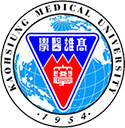— KMU Office for Industry-Academic Collaboration—
The 21st National Innovation Awards in 2024, Kaohsiung Medical University (KMU) achieved an impressive milestone by securing a total of 13 awards, including five Academic Research Category, three Clinical Research Category, and five National Innovation Award renewal and issue the Excelsior Award. These accolades reflect the university’s outstanding capabilities across academic research, clinical application, and technological refinement, solidifying its leadership position in comprehensive medical innovation.
Academic Research Category:Interdisciplinary Excellence Leading to Breakthroughs
The five award-winning technologies in this category not only demonstrate strong academic foresight but also align with pressing clinical needs and industrial application potential:
l Prof. Li-Tzong Chen and the team of Prof. Wen-Chun Hung at the National Health Research Institutes’s team(NHRI) – Developing Humanized CXCR2 Antibodies Therapeutics for Solid Cancer Treatment and Improve Tumor Immune MicroenvironmentDeveloped a highly specific humanized CXCR2 antibody that significantly suppresses the growth of pancreatic and leukemia cells while improving the immune microenvironment. Demonstrating good safety profiles, the antibody shows great potential as a new therapeutic option for CXCR2-related cancers.
l Prof. Tsung-Lin Cheng’s team – Thrombomodulin (TM) and miRNA for Preventing or Treating Osteoarthritis (OA).This innovation enhances the anti-inflammatory response, proliferation, and migration of chondrocytes, offering a novel therapeutic approach for preventing and treating osteoarthritis.
l Prof. Pei-Shih Chen’s team – The innovation technique for surveillance of avian influenza virus in ambient air and species of migratory birds for warning the outbreaks of avian influenza virus Introduced a novel technique capable of collecting and quantifying airborne avian influenza viruses. This enables rapid analysis and supports early prevention strategies for poultry farms and government agencies, reducing public health and economic impacts.
l Assoc. Prof. Wen-Wei Lin’s team - Dual-structural Chromogenic enzyme reporter gene system:A new option for high-throughput drug screening
Significantly reduces costs and improves efficiency in high-throughput drug screening, offering a new tool for drug discovery.
l Assoc. Prof. Chih-Hung Chuang’s team – Develop a dual precursor IFNx-ICB antibody lock platform to improve the efficacy and safety of today’s immune checkpoint inhibitors(ICB) The platform improves therapeutic efficacy and safety of immune checkpoint blockade (ICB) therapies by enhancing drug targeting and reducing adverse effects, thereby opening new possibilities in cancer immunotherapy.
Clinical Research Category:Three AI-Enhanced Precision Medicine Technologies Successfully Implemented in Clinical Applications
KMU’s clinical innovation capabilities are exemplified by three award-winning projects that respond directly to patient needs, enhancing both diagnostic precision and treatment effectiveness:
l Prof. Shu-Pin Huang’s team – Drug Decision Helper for Second-Generation Hormonal Drugs in Prostate Cancer.This service provides pre-treatment predictive testing for prostate cancer patients undergoing second-generation hormone therapy. With a prediction accuracy of 87.25%, it supports physicians in delivering precision medicine and optimizing therapeutic outcomes.
l Prof. Chia-Hsin Chen, Prof. Li-Wei Ko at National Yang Ming Chiao Tung University and Prof. Jyh-Ming Wu at National Tsing Hua University – A novel AI tongue vibration exercise training System.A smart rehabilitation system utilizing tongue stretch sensors and vibration feedback, integrated with visual game training and real-time EEG assessment to enhance patient participation and rehabilitation outcomes.
l Dr. Hao-Wei Chen and the team of Prof. Chung-Yao Kao at National Sun Yat-Sen University - Rapid Kidney Stone AI Screening System.Uses artificial intelligence to analyze basic health examination data and detect kidney stones with 92.7% accuracy—without the need for imaging.
Innovation Advancement: Continuous Optimization for Sustainable Impact
Innovation at KMU extends beyond initial development, focusing on continual refinement and real-world implementation. Five projects, previously awarded the National Innovation Award, were further enhanced and recognized with the Innovation Advancement Award for their sustained excellence and expanded applications:
Prof. Yin-Chih Fu’s team - Minimally Invasive Device for Carpal Tunnel Syndrome Release. Prof. Yur-Ren Kuo’s team – New Innovartion of Detachable Negative Pressure Device for Wound Care. Prof. Lan-Yuen Guo’s team – Innovative Smart Diagnostic Device for Vestibular Function. Prof. Chih-Hsing Hung’s team – Development of portable multifunctional micro-spectrometer to make hospital-based diagnostic laboratories compact and telemedicine more complete. Prof. Chih-Hsing Hung’s team – Eatting Safety –Making Life without Nasogastric Tube Service to Innovation Integrated Care for Dysphagia Patients.
KMU’s outstanding innovations are supported by robust international patent portfolios and proactive industry collaboration. Through translational research and commercialization strategies, the university continues to unlock new value in medical technology and is firmly on course toward competing for the highest honor: the National Sustainable Innovation Model Award.
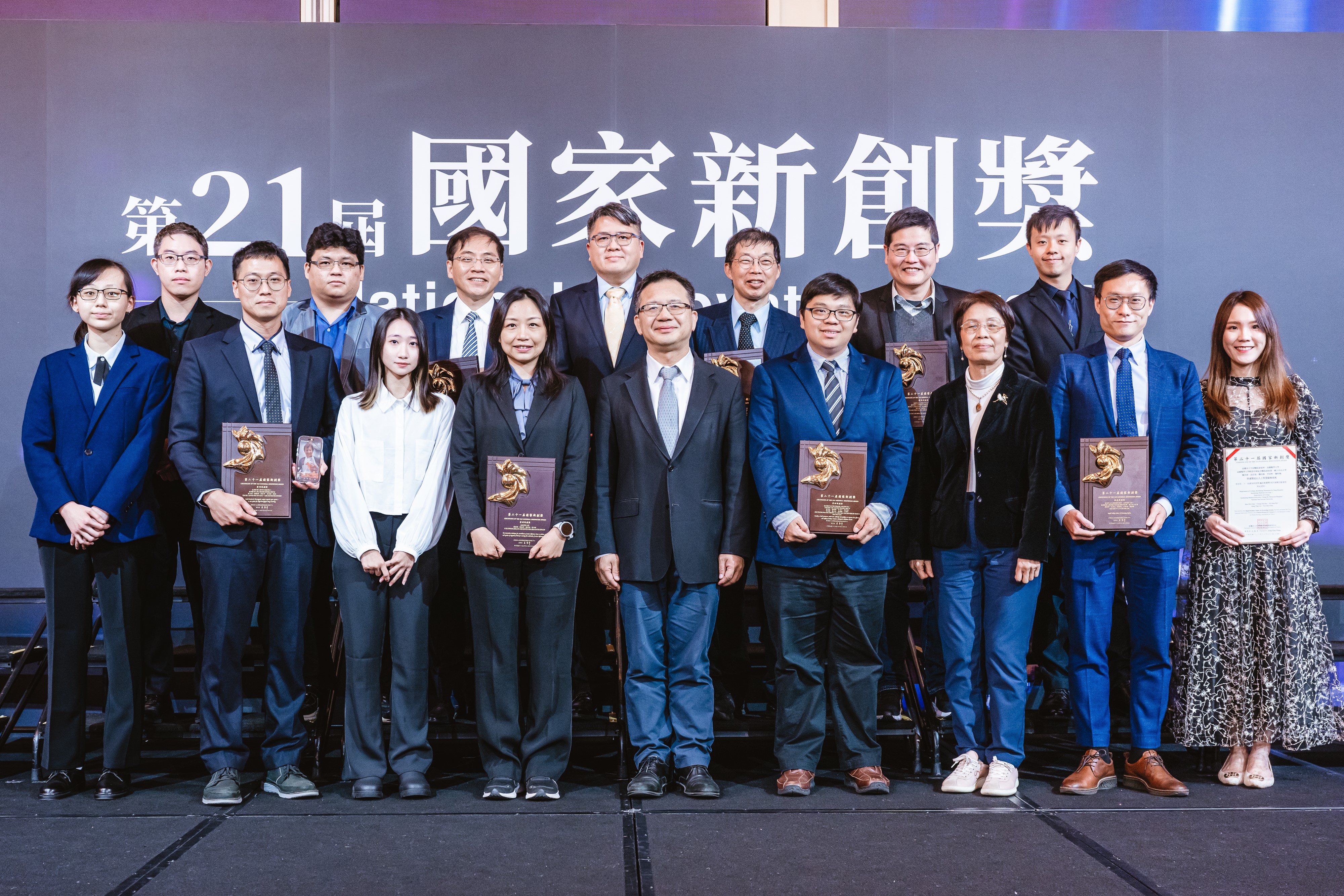
▲ 高醫大榮獲國家新創獎13項獎項肯定,獲獎團隊合影
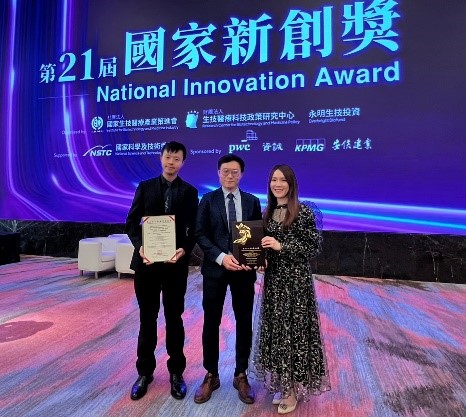
▲ 臨床獲獎團隊泌尿科陳浩瑋醫師(中)、陳妤甄醫師及中山大學魏培修博士
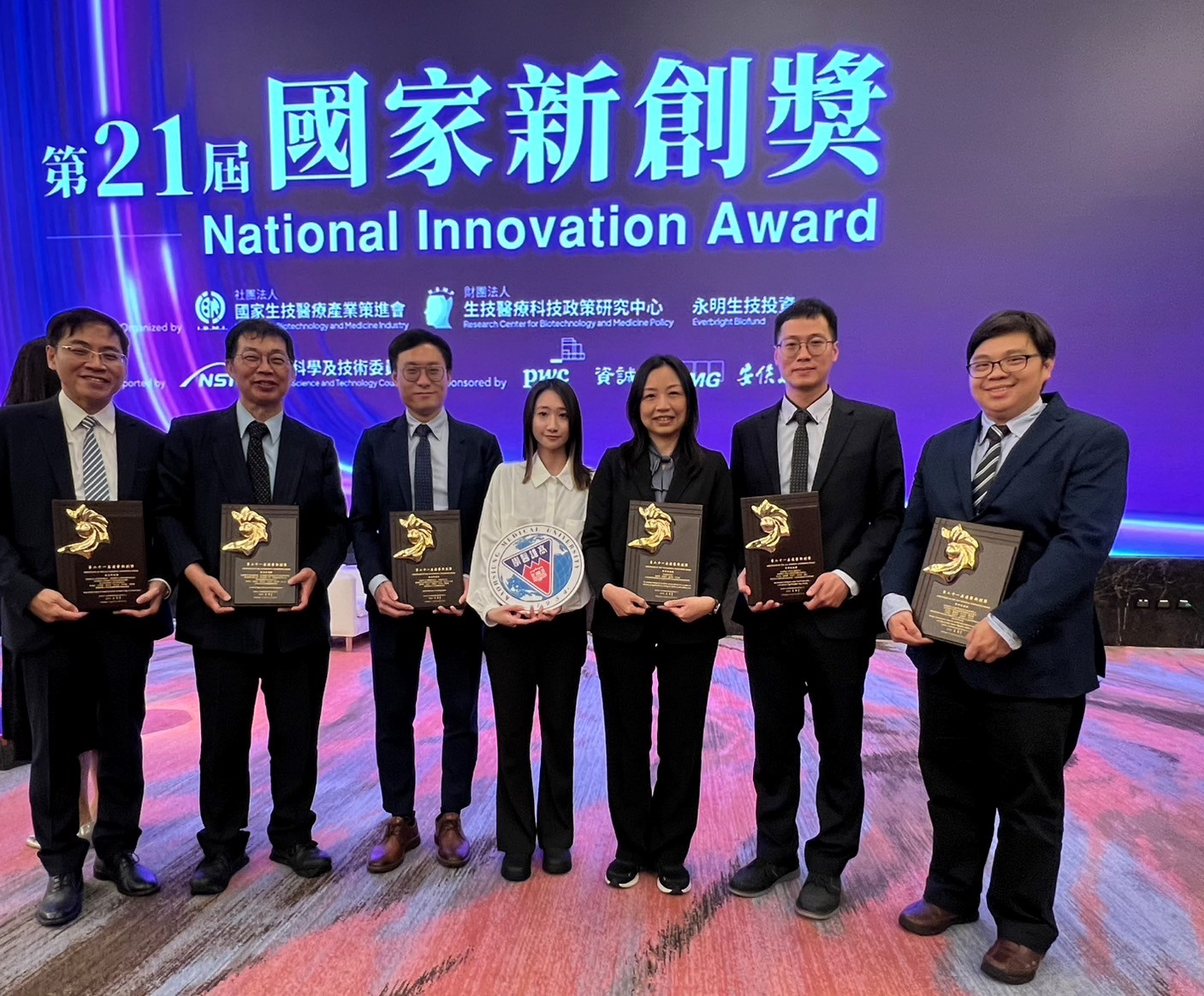
▲ 學研獲獎團隊,右三陳培詩教授、林文瑋副教授、莊智弘副教授及臨床獲獎團隊,左三陳浩瑋醫師、陳嘉炘教授及黃書彬教授
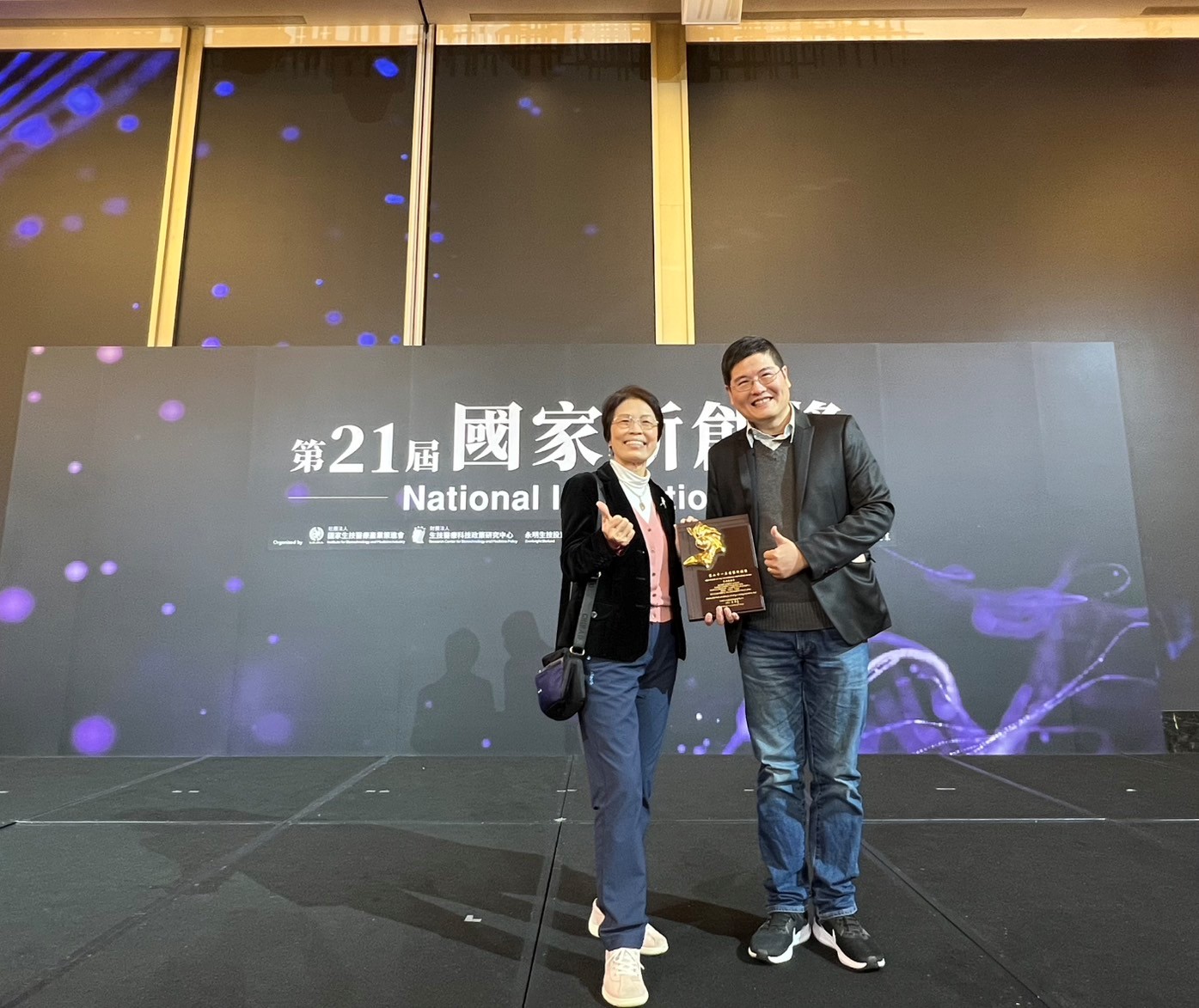
▲ 學研獲獎團隊鄭琮霖教授(右)、何美泠名譽教授
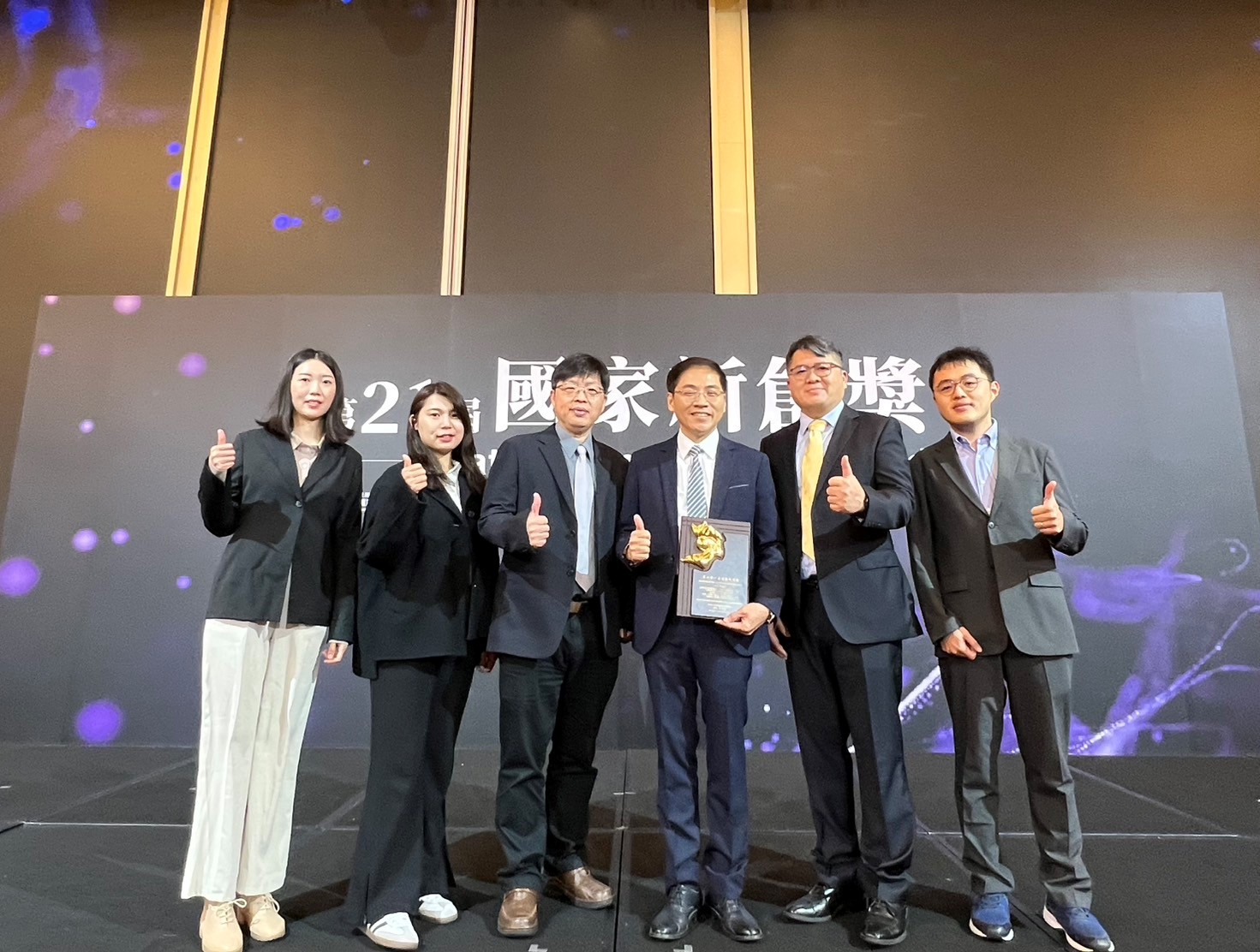
▲ 臨床獲獎團隊泌尿科黃書彬教授(右三)及李佳陽教授(右二)
